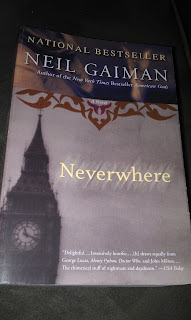Neverwhere
by Neil Gaiman
p. 1996
p. 1996
Existing beneath the surface of London streets is a rail system
that connects all parts of the city. According to Neil Gaiman’s fantasy romp, Neverwhere, also existing beneath the
city streets is an entire culture of people who have fallen through the cracks
of society, people who possess magical abilities unheard of above ground. Neverwhere is the story of one young man’s
journey as he becomes part of this figurative and literal ‘London Underground.’
Richard is an average guy (which, of course, is the best kind of
guy for these kinds of stories); he has an average job with
promotion prospects, a serious girlfriend with marriage prospects, a decent apartment
and his health. He is all set up for a normal and innocuous (if a bit dull) life,
until he helps an injured girl he meets on the street. In an act of mercy,
Richard rescues Door, a girl on the run from a pair of nasty characters who
chased her to ‘London Above’ after murdering her entire family for their unique abilities in—what else—opening doors most cannot.
As a direct result of his brief interaction with Door, Richard’s life is slowly
stripped away as he is first ignored then entirely forgotten by his peers, essentially becoming invisible
to the world. Left with no other choice, Richard takes to the London
Underground to find Door and her bevy of curious comrades and restore the life
that was stolen from him. Instead he finds himself pulled along on a dangerous
journey to discover the truth about Door’s family’s demise—and a plot that
would forever change life Underground.
Though I own the movie adaptations of two of his other novels, Neverwhere is my first foray into the works of Neil Gaiman and I have to say, I like his ideas here. He has a fantastic imagination
and it manifests itself in a lot of creative ways, such as the Floating Market—a
gypsylike bazaar that changes locations and can only be reached by word of
mouth, the mysterious warring class system that exists in London Underground,
and of course, the various machinations of Door’s protector, family friend, and requisite scene-stealer,
the marquis de Carabas, a harlequin-esque rogue to whom there is more than what
appears. Gaiman’s best idea, though, is his ability to draw parallels between
the various characters that populate the Underground and the very real homeless
and disenfranchised. The fact that an entire world exists that no one can see
unless they are looking for it, where people are lost and forgotten and
overlooked, where you too could find yourself if you fell far enough... it’s
all strikingly real when you think of how easy it is for the world to turn a
blind eye on its societal problems. Gaiman just took this parallel many steps
further and turned this land of lost souls into a world unto itself, one with a
purpose and a style all its own.
I enjoyed Gaiman’s imagination when it came to setting and theme,
but I found myself unable to fully immerse myself in the atmosphere of Neverwhere, littered as it was with clichés. Richard and Door and even the
roguish marquis are charming heroes, but there’s nothing new about them.
Richard is your standard everyman, whisked away unwittingly on an adventure. No
one expects much of him and he is entirely unremarkable and yet, when faced
with a challenge that hundreds have failed he inexplicably passes with flying
colors, no explanation given. Door is sweet and innocent, a speaker for and
lover of helpless rats, but she’s got spirit and moxie and it all just makes me
want to gag. She never fully takes credit for destroying Richard’s life and no
one ever calls her on it. The marquis is clever and keeps the reader on their
toes. He was definitely my favorite character but even he failed to completely
win me over with his charm, maybe because I’ve seen it all before.
By far the worst offenders are the villains, though. The treacherous duo that doggedly chase our heroes all throughout the book are the
demonic Mr. Croup and Mr. Vandemar whose villainous villainy is shoved down your
throat until you choke on it (Croup would probably like that though). I found myself rolling my eyes every time Croup
was likened to nails on a chalkboard, every time Vandemar devoured a small
creature, and especially every nauseating time they were respectively referred to as a fox
and a wolf, two creatures which we all
know are notoriously evil in reputation. I feel like the exaggeration
was meant to convey to the reader exactly what bad news these two were, but it
was just so over the top, I found myself not the least bit creeped out by them.
In fact, in most encounters, they aren’t even allowed to engage the heroes
physically, making them the most ineffective creepers in fantasy. Then there’s
the lead villain, the head honcho, a literal fallen angel who speaks in
wispy platitudes and is generally aloof to the fact that he is a raging douchenozzle with a God complex. I could
go on, but I think you get the picture.
I think Gaiman was onto something comparing his ‘London
Underground’ to London’s disenfranchised. I very much liked the idea that there
is a society of people the world has forgotten who have found their own power
and their own place. Gaiman doesn't just leave the door (no pun intended) open for a sequel, it's wide and gaping with a heavenly chorus of angels beckoning you through it without subtlety, and perhaps he’ll get around to it one day. If that happens, I
for one hope Gaiman focuses more on drawing out that parallel and less on over the
top characters having predictable adventures.

No comments:
Post a Comment